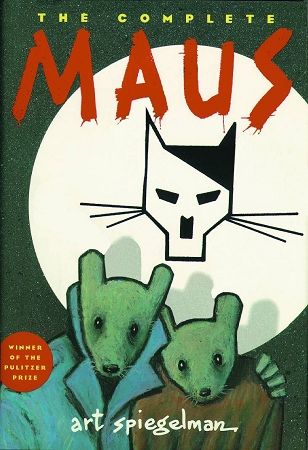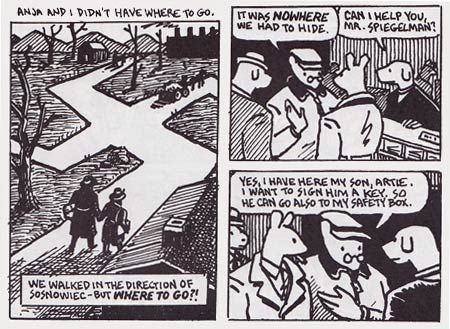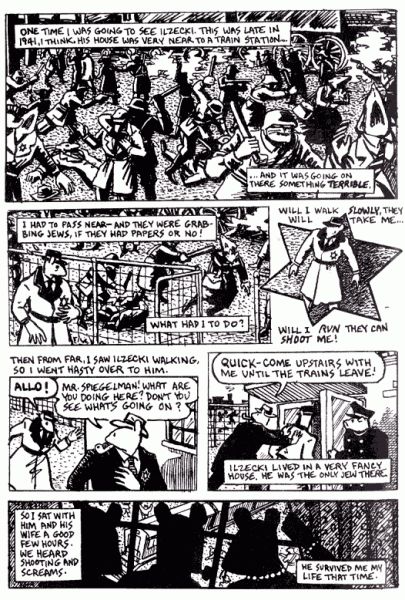In writing up yesterday's indie spotlight on Mila, an animated short film that takes a look at the civilian collateral damage of war, I was reminded of a famous publication that has somehow managed to escape the adaptation machine. Art Spiegelman's Maus, a two-volume graphic novel retelling the war-time horrors of a Holocaust survivor, remains the first and only comic book to win a Pulitzer Prize. Maus was originally published in 1991, so one might wonder why a movie adaptation hasn't already happened. Is Hollywood too squeamish for the source material? Is the concept of using cartoonish animals to illustrate the evils of the Holocaust too confusing for young audiences? Hit the jump to find out. Hollywood! Adapt this: Maus.
What It's About:
Maus is a result of Spiegelman's series of interviews with his father, Vladek, that took place from 1978 to 1979, in which the elder Spiegelman recounted the events of his life as a newly-married Jew in 1930s Poland to the aftermath of his surviving the Holocaust in 1945. A framing story sees Art interacting with his father throughout his life, from an early scene depicting Art as a child, to later events in which an adult Art attempts to reconnect with his estranged father, and continuing after the latter's death. It's during these interviews that Art's character struggles with the choices he must make in order to bring his father's story to life in Art's own graphic novel, and whether or not he should complete the work at all.
The most iconic aspect of Spiegelman's Maus is his depiction of characters in his story as anthropomorphic animals. Jews are drawn as mice, Germans and Nazis as cats, and Polish non-Jews as pigs. (At times, Art's character debates with himself just how to depict a particular character, such as his own wife, Françoise Mouly, a French woman who converted to Judaism; Art couldn't decide whether to draw her as a Jewish mouse, a French frog or something else entirely.) The striking thing about Maus, beyond the horror of the atrocities it explores, is the fact that Spiegelman chose to use cartoonish characters placed in the relatively immature and under-appreciated medium of a comic book in order to tell his most personal and emotionally-complex story. It's interesting to note that Spiegelman could have simply written a memoir on the same experiences, which likely would not have had as much of an impact. His decision to represent the story in a graphic novel is every bit as personal as his decision not to see that story turned into a movie.
How Could / Why Should It Be Adapted?
While Spiegelman has received numerous offers to adapt Maus into a movie, he has replied as follows (via UC Santa Cruz archives):
I don't think it would work. Basically movies are done by groups. Comics can be done by an individual. If there's one thing my father taught me, it's not to trust groups. I'm not interested in making a creation with a committee. I don't understand why everybody is this culture seems to believe it's not real until it's turned into a movie. I do understand all too well, actually. But to me Maus found its proper form and it took me 13 years to give it that form. I'm not interested especially in seeing that diminished. I've had offers that I may pursue. People have come and said, "Alright, so you don't want to make Maus as a movie, what kind of movie do you want to make?" And that I may pursue, because that could be interesting to explore. But then I would be thinking it through from the ground up, as working in that idiom.
Far be it from me to argue with the creator of Maus, an individual effort in every sense of the word and one that's deeply personal to its creator and just happened to be picked up by readers around the world. Spiegelman makes the salient point of movie adaptations being done (and often done in) by committee; we know all too well how film adaptations seem to lose something in translation.
That being said, as personal as Spiegelman's story is, it's a story that demands to be shared. There are stories just like it that now occupy the living memories of millions the world over. Genocide did not stop with the Holocaust, which is an unfortunate reminder that successive generations need to be educated on the horrors of our history in the hope to avoid repeating them. While the graphic novel itself remains available, a film adaptation would likely be more accessible on a visual and emotional level. To keep a story like Spiegelman's behind closed doors would be a disservice. However, Spiegelman also told the Washington Post (via EW):
''I keep my Maus movie rights locked away with [a sign that says]: Break open in case of financial emergency.''
So maybe there's still a chance in the future.
The Final Word
I fully understand Spiegelman's desire to keep Maus as close to the vest as possible because of how personal a story it is to him. What I don't understand is the rationale of keeping a story like Maus out of the hands of filmmakers because of the fear that the adaptation might besmirch his creation. First of all, the story is already out there, in the form that he wants it, all across the world. No film production is going to change that (and it's not as if anyone would take away his Pulitzer). If anything, TV and film adaptations only serve to increase sales and reinvigorate interest in the source properties that inspired them.
Second of all, in the hands of a competent and talented filmmaker who is equally as passionate about the project as Spiegelman is, a film version could actually enhance the original story, not to mention making it more accessible to viewers around the world who had remained ignorant to the graphic novel's existence up until that point. Believe it or not, it's possible for a source material and an adaptation to stand apart on their own merits and have little impact on each other. It's equally possible that Spiegelman, were he to acquiesce and then actually become actively involved with the adaptation process, could find that he has helped create something that exceeds that of his original work. To me, that's a better option than having someone in Spiegelman's estate sell the movie rights somewhere down the line, long after he has any say over the matter. Maus is something I'd love to see brought to the big screen, but only if it aligns with the wishes of its creator.
Be sure to tune in to "Hollywood! Adapt This" next week when we tackle a much lighter property, one that some of you have been suggesting for quite a while now. Here's a hint: Do a barrel roll!




